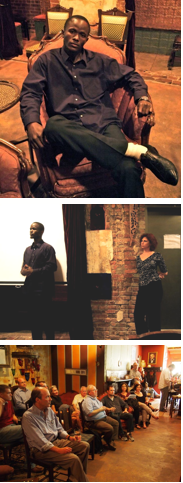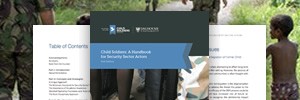Interview with Sam Sherman of Johnny Mad Dog
 Sam, how did you become involved in this film?
Sam, how did you become involved in this film?
A friend who at the time was the Head of Mission of Médecins Sans Frontières for France (Doctor’s Without Borders), was involved with a French director who had come to Liberia. This French director was looking for locations that would be suitable to shoot a feature film, potential characters, connections with institutes working on behalf of child soldiers and a person that would actually know what was going on in the country. So my friend set up a meeting with the directors who explained they had a feature film project based on the book, “Johnny Mad Dog” by Emmanuel Boundzeki Dongala, which documents the author’s experience in the Congolese crisis. The directors wanted to show the world what it is to be a child soldier. When they explained this to me, I said yes, I have no experience in film, but I set up meetings with different NGOs, including international NGOs like Save the Children and the National Commission for Disarmament Demobilization Rehabilitation & Reintegration and local NGOs like Don Bosco, Medicine Du Mondeto, to find former child soldiers to act as the characters. From there, I set up a casting for the small boys unit, and we worked with different institutions to find these children to work on the film.
So these were actual former child soldiers?
Yes, they were all former child soldiers.
And how did you find these children for the roles in the movie? Was anyone worried that reenacting their experience as child soldiers might be harmful for them?
There were a lot of international NGOs that were interested in the project and so we had a lot groups offering to help us work with and find former child soldiers.
They were not really afraid, because it was a way for them to speak about their experience. This way they were able to explain how they got into the war, what happened. It was very cathartic for them. We ended up auditioning a thousand kids in different communities in 2005 and by 2006 we had the kids we were going to work with and we provided an acting coach and a compound for them to learn how to act and to go to school during part of the day too. A lot of these kids didn’t know where their families were, so we needed to have the permission of the children to be part of the film.
A typical day was from 9 to 1 we had a regular program for school, but because all of them had never been to school, they were very bored in school and always fighting. And then from 2 to 5 we had the acting classes with the scripts and acting and that was the regular routine for six months. We had to train them at different locations for shooting.
Do you know if the children in the film were able to see the film?
At the beginning there was a problem to show the film with the Liberian government. We had meetings with officials to explain that this was a way for the Liberian people, who have been victims of war, to be part of the first international Liberian film. In 2008, we were promised that the film would be screened in Liberia, but then for several political reasons it was not screened.
Even though the film was not screened in Liberia, it did receive a lot of international recognition.
Yes, it has including the 2008 Prize Un Certain Regard at the Cannes Film Festival and has been presented at the 2009 Sundance Film Festival, 2008 London Film Festival, 2009 Cinequest Film Festival and the 2008 Melbourne International Film Festival.
Were the kids that were in the film paid?
We had made an effort through a proposal to leave a certain amount of money for the kids. So the directors and I created a foundation to ensure that money is available for the kids. Around this time, I took a leave from the project, and when I was away there was a mismanagement of funds by the administration, so they were not paid.
However, the director and I sat down and the director asked me if I wanted to be in charge of the Johnny Mad Dog Foundation. He said that he is a film maker and that is what he knows, and wouldn’t be able to run a foundation like this, but would like me to take this over. That I could work this community of child soldiers through the foundation and use the screenings of the film to generate funds for the foundation.
What are your goals for the Johnny Mad Dog Foundation?
Our mission is to create an interest in what is happening with child soldiers and children in war affected areas. Also, we want to help the kids that were in the film, who became especially interested in entertainment and film making after their experience as actors. The kids have skills in acting now and would like to use them and we explained to them they need to attend our education program in our foundation because if they want to be actors, they need to learn to read and write.
Do you know what the children that were in the film are doing now?
Well, they went to school for awhile, but they just weren’t used to it. It was too hard for them to concentrate. They said that “the government killed our dreams, they didn’t offer us any support after the war” so they feel left behind.
Can you tell me more about your personal story growing up in Liberia during the war?
My father was a diplomat and so my mom was able to go the United States, but she didn’t want to leave my sister and I alone, so we stayed in Liberia and experienced the war from the beginning in 1989. Running away from air bombing raid or heavy bombardments from fighting and migrating from war zones became everyday events. I was confronted on numerous occasions with ex-combatants, both adults and child soldiers and was embarrassed by CAFF groups (Children Associated with Fighting Forces ). Sometimes other children like me would get hurt or lose their life from resisting to follow them, so families and children who were confronted with these situations were always afraid and living in fear. Every time I saw a group of fighters or child soldiers I was afraid of either being flogged or recruited to fight war.
We went to the Ivory Coast by 1992 and were very happy to have refuge and to be able to continue school. My Dad came back to Liberia in early 1995, and so I came back around 1997. I went to school with older ex-combatants, who went back to school, and former child soldiers.
It was strange for me adopt into a traumatized society with war victims and ex-combatants, who were violent, but I did. During this time, I tried to discourage children, who were associated with the fighting forces, from fighting. They would explain to me their stories and tell me things like, “I don’t sleep” or “if I have to, I sleep alone” because of nightmares they would have of their experience in the war. Their stories touched me. I was afraid and careful, so I always asked them many questions and befriended them. Instead of discouraging them, I saw my self encouraging them in another way and we became friends–taking them to my house and getting to know my family. They began to trust me and felt comfortable telling me their stories.
And right now you’re in the United States studying and working on the Foundation?
Regarding my educational background, I’m at Howard Community College and I am studying criminal justice. I also just completed a program in international mediation and peace keeping, which I want to use abroad in post-conflict zones. With my background in Liberia, I personally want to use this mediation and experience in peace keeping to help people in war affected areas, especially in post-conflict areas to heal. Hundreds of thousands of kids were affected by the war in Liberia, some have fled, some are still in Liberia, and many of them are just not accounted for. People are still marginalized and not getting the support they need. There are kids in graves there that we don’t know who they are, kids who are alive there tell me they have no parents, no home, no support. When I go back there they say please get international attention for us.

